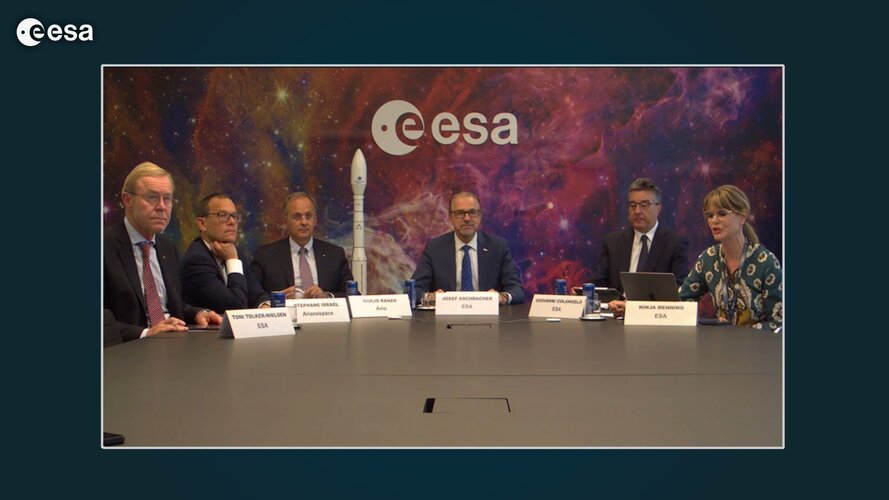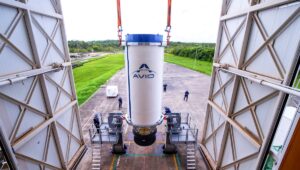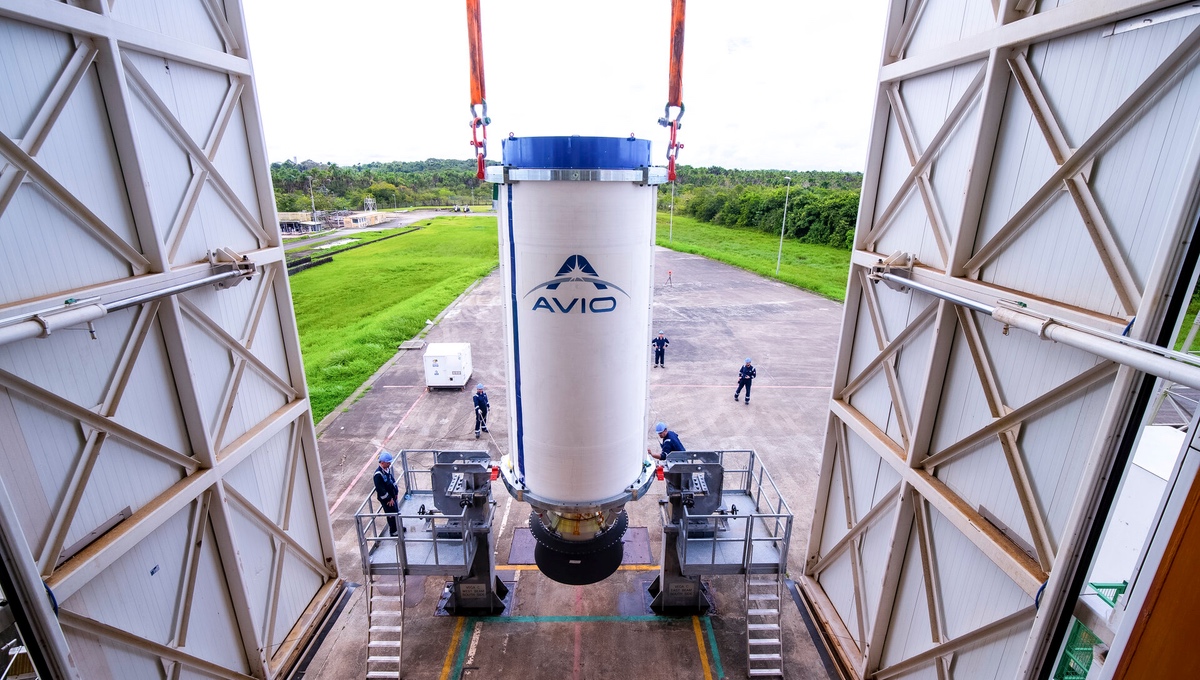Massive low-Earth orbit communications satellites could disrupt astronomy
Monday, 02 October 2023 14:00
Observations of the BlueWalker 3 prototype satellite show it is one of the brightest objects in the night sky, outshining all but the brightest stars.
Astronomers have raised concerns that without mitigation, groups of large satellites could disrupt our ability to observe the stars from Earth and perform radio astronomy.
Several companies are planning "constellations" of satellites—groups of potentially hundreds of satellites that can deliver mobile or broadband services anywhere in the world.
However, these satellites need to be in "low-Earth" orbit and can be relatively large, so their potential to disrupt night-sky observations is a concern.
Now, an international team of scientists led by astronomers from the IAU Center for the Protection of the Dark and Quiet Sky from Satellite Constellation Interference (CPS) and including Imperial College London researchers, have published a paper in Nature assessing the detailed impact of the prototype BlueWalker 3satellite on astronomy.
Media briefing: Findings of the Independent Enquiry Commission on Vega-C test
Monday, 02 October 2023 10:52 Video:
00:42:00
Video:
00:42:00
Media briefing on the findings of the Independent Enquiry Commission tasked with analysing the results of the static-firing test of the Vega-C Zefiro 40 motor, which took place on 28 June 2023.
The press briefing was held on 2 October 2023 with ESA Director General Josef Aschbacher presenting the results of the investigation, with ESA Inspector General and chair of the Independent Enquiry Commission Giovanni Colangelo; Avio CEO Giulio Ranzo, Arianespace CEO Stéphane Israël, and ESA’s Director of Space Transportation Toni Tolker-Nielsen.
During the briefing, ESA and its partners presented the findings of the enquiry commission, together with an
Webb’s wide-angle view of the Orion Nebula is released in ESASky
Monday, 02 October 2023 09:00
New images of the Orion Nebula from the NASA/ESA/CSA James Webb Space Telescope have been included in ESA’s ESASky application, which has a user-friendly interface to visualise and download astronomical data.
Scientists prove that antimatter falls at the same rate as matter
Monday, 02 October 2023 06:33 Early on in science classes all over the world, students drop diverse things to learn how gravity works and learn how outside forces might affect the rate of fall. But the science of falling goes well beyond the bowling ball and feather experiment. Einstein's theory of relativity is still being studied, applied and proven a multitude of ways today. For instance, the Antihydrogen Laser Physics Ap
Early on in science classes all over the world, students drop diverse things to learn how gravity works and learn how outside forces might affect the rate of fall. But the science of falling goes well beyond the bowling ball and feather experiment. Einstein's theory of relativity is still being studied, applied and proven a multitude of ways today. For instance, the Antihydrogen Laser Physics Ap NASA selects four small explorer mission concept studies
Monday, 02 October 2023 06:33 NASA has selected four small explorer missions to conduct concept studies. These studies aim to expand knowledge of the dynamics of the Sun and related phenomena, such as coronal mass ejections, aurora, and solar wind to better understand the Sun-Earth connection.
Any missions selected to move forward after the concept studies are conducted will join the current heliophysics mission fleet,
NASA has selected four small explorer missions to conduct concept studies. These studies aim to expand knowledge of the dynamics of the Sun and related phenomena, such as coronal mass ejections, aurora, and solar wind to better understand the Sun-Earth connection.
Any missions selected to move forward after the concept studies are conducted will join the current heliophysics mission fleet, German tech factory reveals antenna prototype-ngVLA will open a new window into the Universe
Monday, 02 October 2023 06:33 Usually it's Octoberfest that draws a crowd to Germany this time of year. For hundreds of folks gathered at mtex antenna technology in Schkeuditz, it's a first look at a prototype radio telescope that may one day be part one of the world's largest and most sensitive radio telescopes in the world, the National Radio Astronomy Observatory's (NRAO) next generation Very Large Array (ngVLA). The prot
Usually it's Octoberfest that draws a crowd to Germany this time of year. For hundreds of folks gathered at mtex antenna technology in Schkeuditz, it's a first look at a prototype radio telescope that may one day be part one of the world's largest and most sensitive radio telescopes in the world, the National Radio Astronomy Observatory's (NRAO) next generation Very Large Array (ngVLA). The prot Your Interactive Guide to the 2023 Annular Solar Eclipse
Sunday, 01 October 2023 21:39 Have you ever wondered how to track an eclipse down to the exact second? NASA has you covered! As the countdown to the highly anticipated Oct. 14, 2023, annular solar eclipse continues, NASA is proud to unveil the Eclipse Explorer - an interactive map designed to enhance your eclipse-viewing experience. Crafted to complement our existing static eclipse maps, this tool enables users to dive into
Have you ever wondered how to track an eclipse down to the exact second? NASA has you covered! As the countdown to the highly anticipated Oct. 14, 2023, annular solar eclipse continues, NASA is proud to unveil the Eclipse Explorer - an interactive map designed to enhance your eclipse-viewing experience. Crafted to complement our existing static eclipse maps, this tool enables users to dive into China's solar telescope array officially completed
Sunday, 01 October 2023 21:39 The Daocheng Solar Radio Telescope, a solar telescope array in southwest China, passed key testing on Wednesday, marking the official completion of the world's largest synthesis aperture radio telescope, according to the Chinese Academy of Sciences (CAS).
The CAS said that the telescope array is a landmark equipment of the country's space environment ground-base comprehensive monitoring ne
The Daocheng Solar Radio Telescope, a solar telescope array in southwest China, passed key testing on Wednesday, marking the official completion of the world's largest synthesis aperture radio telescope, according to the Chinese Academy of Sciences (CAS).
The CAS said that the telescope array is a landmark equipment of the country's space environment ground-base comprehensive monitoring ne Eutelsat and OneWeb combination world's first GEO-LEO Operator
Sunday, 01 October 2023 21:39 Eutelsat Communications SA (Euronext Paris: ETL) has announced the completion of its all-share combination with OneWeb, the global low Earth orbit (LEO) satellite communications network, following the approval at the Ordinary and Extraordinary General Meeting of Eutelsat shareholders. This combination forms Eutelsat Group.
The Company remains headquartered in Paris. OneWeb will be a subsid
Eutelsat Communications SA (Euronext Paris: ETL) has announced the completion of its all-share combination with OneWeb, the global low Earth orbit (LEO) satellite communications network, following the approval at the Ordinary and Extraordinary General Meeting of Eutelsat shareholders. This combination forms Eutelsat Group.
The Company remains headquartered in Paris. OneWeb will be a subsid Scientists observe the influence of gravity on antimatter for the first time
Sunday, 01 October 2023 21:39 Scientists have demonstrated the existence of gravity between antimatter and Earth, reaffirming Albert Einstein's General Theory of Relativity.
It is thought that Isaac Newton's historic work on gravity was inspired by watching an apple fall to Earth from a tree. But for decades, scientists have wondered what would happen to an "anti-apple" made of antimatter - would it fall in the same wa
Scientists have demonstrated the existence of gravity between antimatter and Earth, reaffirming Albert Einstein's General Theory of Relativity.
It is thought that Isaac Newton's historic work on gravity was inspired by watching an apple fall to Earth from a tree. But for decades, scientists have wondered what would happen to an "anti-apple" made of antimatter - would it fall in the same wa Maritime Launch unveils commercial suborbital program at Spaceport Nova Scotia
Sunday, 01 October 2023 21:39 Maritime Launch Services Inc. (NEO: MAXQ; OTCQB: MAXQF) unveiled its suborbital launch program currently scheduled to begin during the second quarter of 2024.
Maritime Launch's suborbital program called Dedicated Altitude Research and Testing (DART), is a program designed to offer flight opportunities to researchers across a wide range of mission capabilities, ranging from building and tes
Maritime Launch Services Inc. (NEO: MAXQ; OTCQB: MAXQF) unveiled its suborbital launch program currently scheduled to begin during the second quarter of 2024.
Maritime Launch's suborbital program called Dedicated Altitude Research and Testing (DART), is a program designed to offer flight opportunities to researchers across a wide range of mission capabilities, ranging from building and tes Ethical guidelines needed before human research in commercial spaceflight is ready for liftoff
Sunday, 01 October 2023 21:39 A global, multidisciplinary team of bioethicists, health policy experts, commercial spaceflight professionals and space health researchers, including Rachael Seidler from the University of Florida, has developed guiding principles and best practices to help ensure human research conducted in space is safe and inclusive.
The proposed ethical guidelines were released Friday in a policy paper
A global, multidisciplinary team of bioethicists, health policy experts, commercial spaceflight professionals and space health researchers, including Rachael Seidler from the University of Florida, has developed guiding principles and best practices to help ensure human research conducted in space is safe and inclusive.
The proposed ethical guidelines were released Friday in a policy paper GITAI passes all NASA safety reviews for ISS external demonstration
Sunday, 01 October 2023 21:39 GITAI USA Inc. and GITAI Japan Inc. (GITAI), the world's leading space robotics startup, successfully completed all NASA safety reviews required for the ISS external demonstration. Furthermore, GITAI handed over the GITAI robotic flight model to NASA in August 2023 and is now ready for launch. The GITAI robotic flight model is scheduled to journey to the ISS for its deployment in early 2024. Ple
GITAI USA Inc. and GITAI Japan Inc. (GITAI), the world's leading space robotics startup, successfully completed all NASA safety reviews required for the ISS external demonstration. Furthermore, GITAI handed over the GITAI robotic flight model to NASA in August 2023 and is now ready for launch. The GITAI robotic flight model is scheduled to journey to the ISS for its deployment in early 2024. Ple Global team recommends ethical rules for human research in commercial spaceflight
Sunday, 01 October 2023 21:39 The first ethical framework for conducting human research on commercial spaceflight was proposed in an article in Science by an international team that included Hastings Center president Vardit Ravitsky. Ravitsky's contribution focused on promoting diversity among the researchers and participants, which is essential to ensuring the research benefits society at large.
Human research on comm
The first ethical framework for conducting human research on commercial spaceflight was proposed in an article in Science by an international team that included Hastings Center president Vardit Ravitsky. Ravitsky's contribution focused on promoting diversity among the researchers and participants, which is essential to ensuring the research benefits society at large.
Human research on comm 


